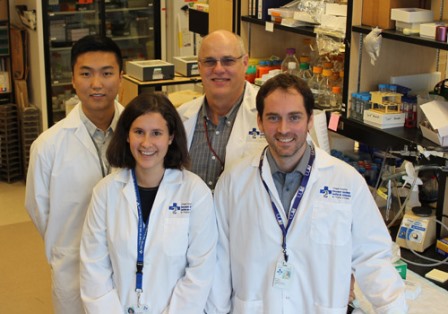
Research at The Ottawa Hospital and the University of Ottawa is providing new hope for people like Alex Chiabai, 15, and his mother, Debra Chiabai.
Like most 15-year-olds, Alex Chiabai would much rather be playing Star Wars video games than studying for tomorrow’s geography test. The chatty and opinionated teen keeps up with the latest technology trends and is always ready to discuss his favourite TV shows.
But Alex also faces unique challenges compared to most teenagers. And a new study from The Ottawa Hospital and the University of Ottawa is poised to pave the way for new treatments for his condition.
The problems started when Alex was a toddler. He was late on many developmental milestones, walked with a sway in his hips and often fell down. His family doctor referred him to the Children’s Hospital of Eastern Ontario (CHEO), where he was diagnosed with Duchenne muscular dystrophy just before his third birthday. This rare degenerative disease affects one in 3,600 boys and is fatal in the second or third decade of life.
As Alex grows, his muscles became progressively weaker, and these days he uses a wheelchair to zoom around school. Steroids and physical therapy can slow down the disease’s progress, but there currently is no cure.
Researchers at The Ottawa Hospital recently discovered that Alex’s condition affects the muscle’s stem cells, not just the muscle fibres as previously thought.
“This completely changes our understanding of Duchenne muscular dystrophy and could eventually lead to far more effective treatments,” said Dr. Michael Rudnicki, a senior scientist at The Ottawa Hospital, professor at the University of Ottawa and senior author of the study.
That could mean a whole new approach to treating boys like Alex.
“I was particularly excited about this research because it opens up an avenue that people hadn’t been looking at,” said Alex’s mother, Debra Chiabai. “The more we know about the disease, the more targeted the efforts can be made on developing treatments. Maybe there are already drugs on the market that will target that pathway.”

A new study from The Ottawa Hospital and the University of Ottawa is poised to completely change our understanding of Duchenne muscular dystrophy and pave the way for more effective treatments. The research team includes Will Wang (left), Caroline Brun, Dr. Michael Rudnicki and Dr. Nicolas Dumont.
Dr. Rudnicki and his colleagues, including researchers at CHEO, are already looking for ways to correct the new problems they’ve identified in muscle stem cells. They already have some promising leads.
“I’m not sure if we will ever cure Duchenne muscular dystrophy,” said Dr. Rudnicki. “But I’m very hopeful that someday in the future we will have new therapies to turn this devastating, lethal disease into a chronic but manageable condition.”

Support patient care and research at
The Ottawa Hospital


 To reset, hold the Ctrl key, then press 0.
To reset, hold the Ctrl key, then press 0.